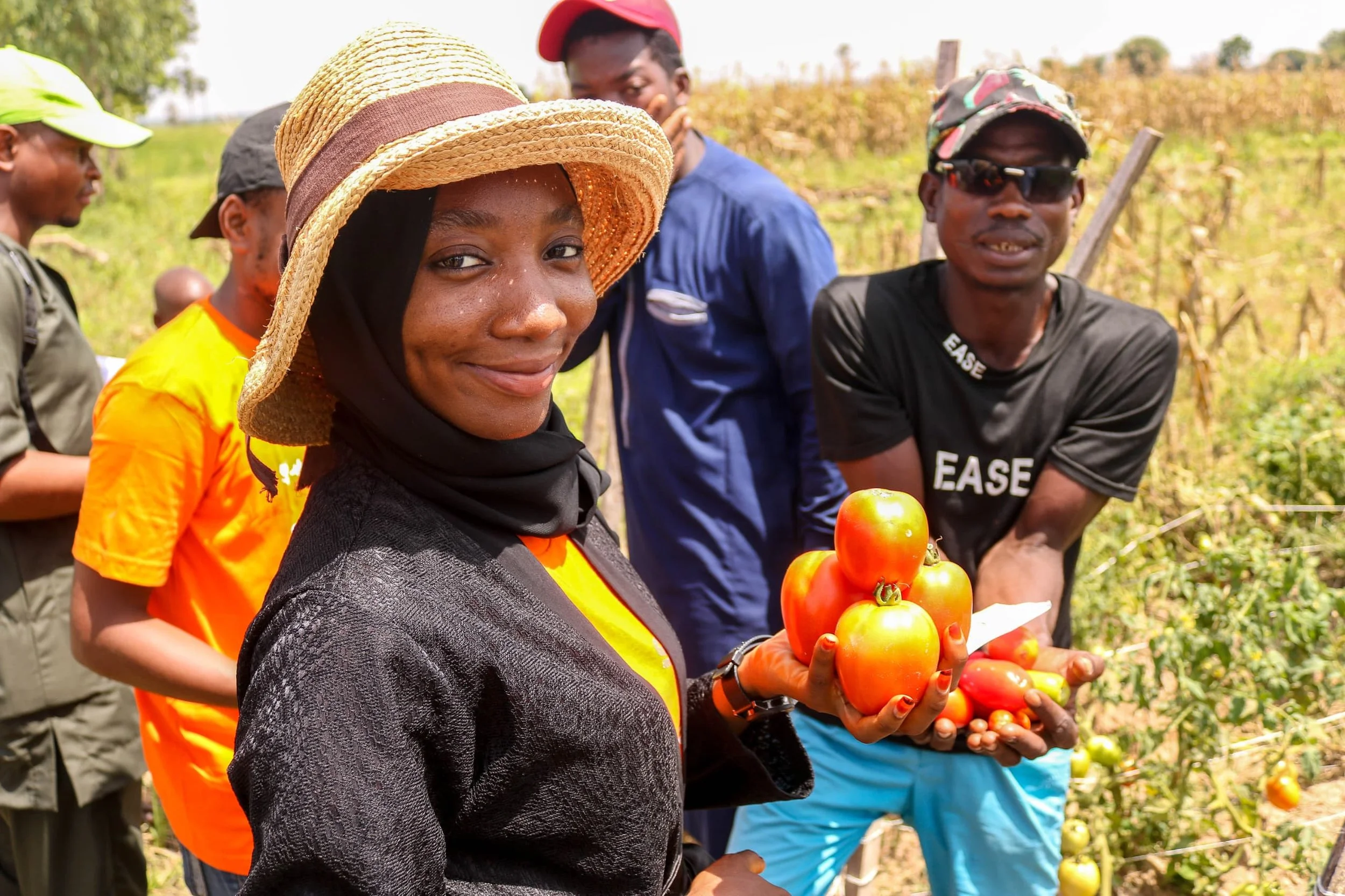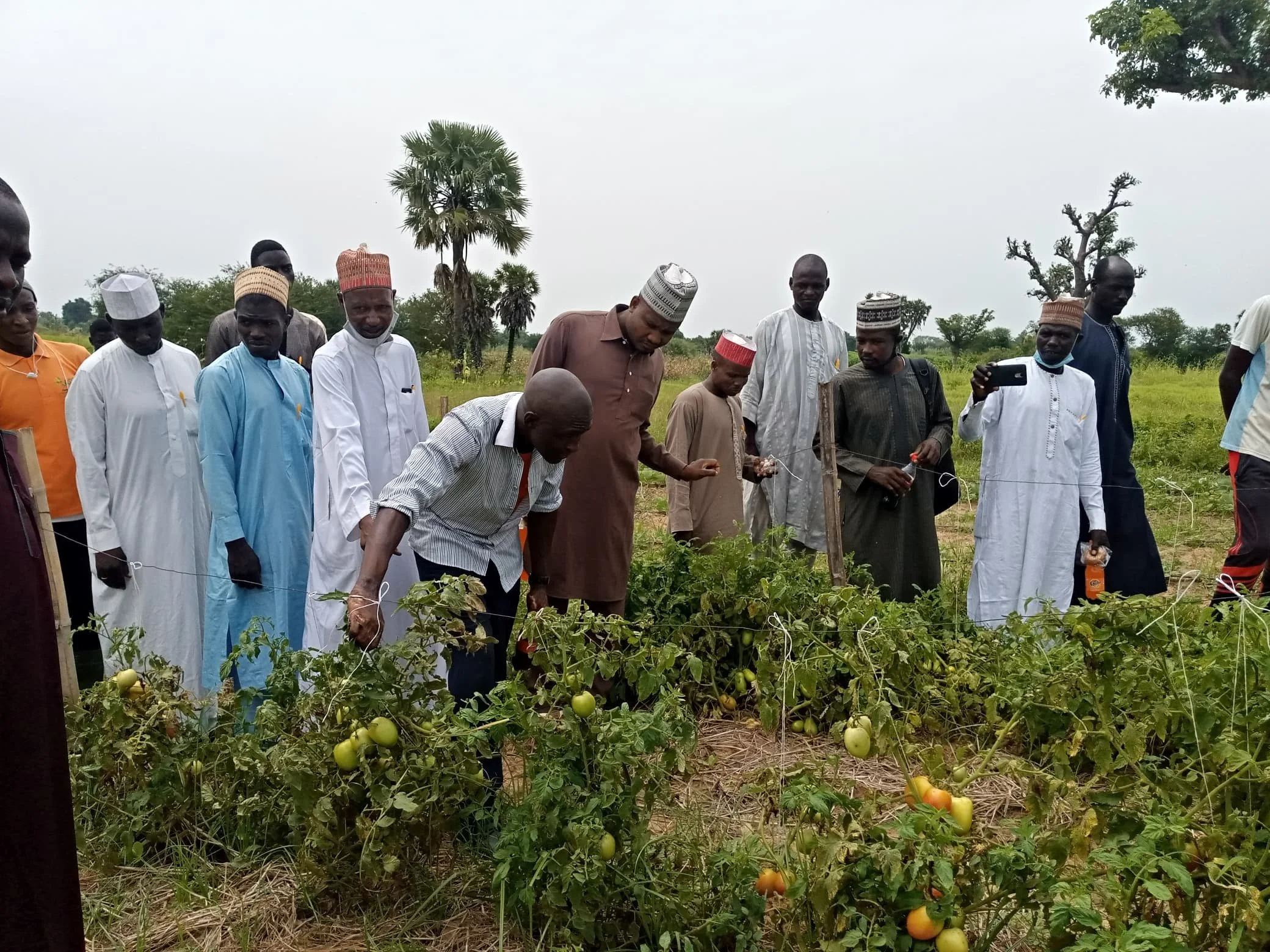A prominent collaboration between Dutch seed and biological crop companies in Nigeria's horticultural landscape.
A conversation with Kabir Ademoh on Seeds4Change Nigeria. Since 2019 he has coordinated the Seeds4Change project. This served as his introduction to seeds and Dutch culture. He is currently exploring the expansion of the Seeds4Change impact cluster into various regions, including Benin.
Can you tell me more about the Seeds4Change project?
“The Seeds4Change Nigeria initiative was a three-year Impact Cluster project and was executed and coordinated by NABC. The project involved collaboration with five vegetable breeding companies and one biological crop protection company. The geographic focus was on Kano, the largest horticultural area in the country. The project conducted extensive training for individual farmers in the sector”.
Our approach included the following components:
1) Demonstrating the practical application of growing new vegetable varieties.
2) Improving knowledge and skills of field staff to ensure effective implementation.
3) Strengthening the capacity of knowledge institutions in the sector.
4) Improving market access for the seed companies, aimed at increasing widespread adoption.
Harvesting tomatoes
The initiative had a systematic approach that included trials and demonstrations conducted directly on farmers' fields. This approach helps in identifying which traits are popular with farmers and provides insights why varieties are well-received. The collaboration aimed to address the direct needs and challenges of farmers”.
What is the specific role and added value of Dutch partners in your project?
“The project involved collaboration with prominent entities such as Syngenta Vegetables, Enza Zaden, Bakker Brothers, Rijk Zwaan, East West Seed,WUR, 2SCALE, , Koppert Biological Systems and Bayero University of Kano (BUK). The overarching objective was to cultivate healthy vegetables using inputs from the consortium partners”.
“The project was organized as a pre-competitive phase and focused on increasing the uptake of hybrid seed varieties (as compared to OPV and farm saved seed). AS such, the project aimed to illustrate the potential of hybrids while at the same time showcasing the Dutch brand. Importantly, company names were kept confidential, and varieties were coded to ensure farmers remained unaware of the specific seed suppliers. This strategy allowed the focus to center on the comparison between hybrid and OPV (Open Pollinated Variety) seeds”.
“The project helped in company and variety registration. This approach was especially beneficial for companies newly establishing their presence in the country, providing them with a strategic entry point. The emphasis on the pre-development stage underscored the significance of laying a robust foundation for the project, contributing to its overall success.”
“In the first few years, the project experienced success. However, as the recruitment of more field agents increased, leading to a broader network of distributors training farmers, maintaining the original anonymous approach became challenging. And we saw a shift towards a more individualized branded presence in the field”.
“The project began with a broad crop approach but evolved to a more specific crop value-chain approach. Several companies aligned their crop portfolio to one or two companies to streamline operations. As a result we started focusing on five key crops: tomato, onion, cabbage, and watermelon. The project considered these as they are the most produced and consumed crops in Nigeria. To optimize impact, a crop value chain approach was introduced, directing attention towards the crop that held the highest production and consumption rates in the country. This strategic focus aimed to maximize the project's effectiveness within the agricultural landscape of Nigeria”.
What has been your biggest success so far?
“The impact of Dutch seed companies on the ground was substantial, although many initially faced challenges in establishing a robust presence and finding distributors in Nigeria. The successful integration of Dutch seed companies was not only a testament to embedding their presence but also reflected a broader understanding of navigating the complexities of the seed sector in Nigeria. Notably, synergies were forged with the National Agricultural Seed Council, contributing to the tightening of regulations and the enhancement of overall systems”.
“Seeds4Change serves as an exemplary model for new programs. In its early stages, interest from stakeholders was limited. However, through strategic groundwork and the cultivation of strong partnerships at the local level, the program overcame initial scepticism. This was achieved while ensuring compliance with regulations and fostering collaboration with other companies”.
“One notable success was the ability to extend production beyond traditional seasons, particularly with hybrids excelling in the rainy season. This led to a significant increase in seasonal vegetable production, showing a remarkable 50% increase in vegetable seed sales. The impact extended beyond commercial gains, influencing local consumption patterns and extending the vegetable season”.
“An interesting observation was the demographic trend among purchasers of hybrid seeds, with a notable preference among younger people. The ease with which youth embraced innovation, coupled with higher access to finance, set them apart from traditional older smallholder farmers. The adoption rate among the target population—predominantly older farmers—remained relatively low for demonstrated varieties”.
“Addressing access to finance became a priority, particularly in collaboration with the DANSA tomato factory. Leveraging government funds to purchase seedlings for distribution to farmers emerged as an innovative strategy. The emphasis on processing and the exploration of avenues to encourage fresh market buyers to invest in hybrid seeds further underscored a holistic approach to market linkage”.
“In summary, the Seeds4Change initiative not only succeeded in bringing Dutch seed companies into the Nigerian landscape but also demonstrated a comprehensive understanding of local dynamics, regulatory frameworks, and innovative strategies to drive adoption and market linkages”.
What would you have done differently in retrospect if you could start all over again?
“A more strategic emphasis on the value chain and market entry before engaging with smallholders reflects a nuanced understanding of the agricultural landscape. By establishing clear market offtake agreements, the project could not only boost productivity but also ensure a streamlined route to market”.
“What we learned is to put more focus on younger and female farmers from the start, as they are more open to innovation and change. Convincing newcomers to the agricultural industry may be easier than changing old farmers habit. Besides, we could expand the project's geographic scope to more tropical regions, looking at a nationwide approach and increasing the scale of operations”.
Field inspection
For you personally, what are some of the reasons that you enjoy working in the seed sector?
“I find great fulfilment in working within the seed sector, a passion that took root during my early years when I pursued studies in chemistry. Returning to the farm, I observed that the ultimate determinant of productivity extends beyond technological advancements. It hinges significantly on the quality of the seeds. This realization fired my interest in the dynamic world of seeds and their important role in agricultural success”.
“My journey into the seed sector was a bit by surprise and chance and it led to a road of continuous exploration and deepening my knowledge of the subject. My academic background helped me understand the scientific nuances of seed sector development”.
“Beyond my professional engagement, I also have a personal stake in agriculture. I manage my own vegetable garden that I inherited from my father, which comprises 1.5 hectares. I've established a connection with the land. Additionally, I contribute to my community by selling vegetable baskets, fostering a hands-on approach and a sense of shared prosperity”.
“In essence, my involvement in the seed sector is not just a career choice, it's a personal journey marked by genuine passion, scientific understanding, and a commitment to cultivate success within both my personal endeavours and the broader community”.



